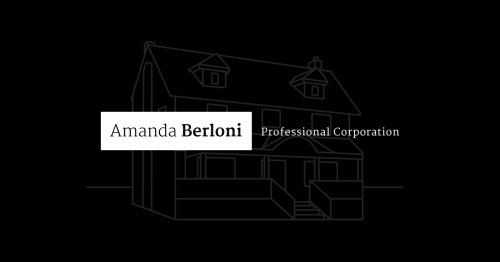Best Water Law Lawyers in Greater Sudbury
Share your needs with us, get contacted by law firms.
Free. Takes 2 min.
List of the best lawyers in Greater Sudbury, Canada
About Water Law in Greater Sudbury, Canada
Water law in Greater Sudbury refers to the collection of legal principles, statutes, and regulations governing the use, management, and protection of water resources in the region. This area of law impacts lakes, rivers, groundwater, and wetlands in and around Greater Sudbury. Given Sudbury's unique landscape, with its many lakes and significant mining activities, water law can intersect with environmental protection, municipal regulation, conservation, and land use planning. Both provincial and federal laws shape how water resources are allocated, protected, and shared.
Why You May Need a Lawyer
There are several situations where individuals, businesses, and organizations in Greater Sudbury may require legal advice regarding water law:
- Disputes over water access or usage between neighbours or property owners
- Concerns about water contamination affecting private wells, lakes, or streams
- Compliance issues related to municipal or provincial water regulations
- Challenges with permits for docks, shorelands, or watercourse alterations
- Mining operations or industrial activities impacting water resources
- Issues relating to water rights and transfers during property transactions
- Legal action regarding flooding, drainage, or runoff problems
- Enforcement or defense in cases involving alleged environmental harm or contraventions
A lawyer can help with interpreting complex laws, mediating disputes, representing you in court, and ensuring proper steps are taken to protect your interests.
Local Laws Overview
Water law in Greater Sudbury is shaped by multiple layers of regulation. The primary legislative frameworks include:
- The Ontario Water Resources Act - This governs activities such as water taking, discharge, and wastewater management.
- The Environmental Protection Act - This addresses pollution and hazardous materials affecting water quality.
- Municipal by-laws - City of Greater Sudbury has regulations concerning stormwater management, sewer use, wellhead protection, and land use planning affecting water.
- The Lakes and Rivers Improvement Act - This regulates construction or alterations to watercourses, including dams, channels, and shorelines.
- Relevant conservation authorities - Regulate development near floodplains, wetlands, and waterways to protect ecological health.
- Federal laws - Such as the Fisheries Act or the Navigation Protection Act may apply to larger water bodies or navigable waters.
Permitting, consultation, and environmental assessments are commonly required for activities impacting water in Sudbury. Violations can result in substantial fines or injunctions.
Frequently Asked Questions
What is water law and why does it matter in Greater Sudbury?
Water law addresses the ownership, use, and protection of water resources. In Sudbury, it is significant due to the region's geology, high number of lakes, industrial activity, and the need to balance environmental with community and economic interests.
Who owns the water in Greater Sudbury?
In Ontario, water resources are generally considered a public resource managed by the Crown. However, property owners may have rights to use water on or under their land, subject to legal restrictions.
Do I need a permit to take water from a lake or stream?
Yes, in most cases. Taking more than 50,000 litres of water per day from any source requires a Permit to Take Water from the Ontario Ministry of the Environment, Conservation and Parks. Smaller amounts may not require a permit but are subject to regulation.
Can I build a dock or other structure on lakefront property?
Construction of docks, boathouses, or other shoreland modifications usually requires municipal approvals and may also need permits from provincial authorities depending on location, size, and environmental impact.
What happens if my neighbour's activities pollute a water source on my property?
You may have recourse under provincial law or civil litigation if you can prove negligence or violation of environmental statutes. Contact municipal or provincial environmental authorities and consider consulting a lawyer.
Are there special rules for wells and groundwater in Sudbury?
Yes, there are provincial standards for well construction, maintenance, and abandonment. Municipal requirements may also exist to protect drinking water sources, especially in designated wellhead protection areas.
What should I do if I want to develop my property near a wetland or shoreline?
Before starting any work, consult the local conservation authority and municipal planning office. Permits, environmental assessments, and compliance with provincial legislation are likely required.
How are water disputes between neighbours usually resolved?
Disputes may be resolved through negotiation, mediation, or legal action. A lawyer specializing in water law can assist in evaluating options and protecting your interests.
What penalties exist for violating water laws in Sudbury?
Penalties can include substantial fines, remediation orders, stop-work orders, and even imprisonment in severe cases. Both individuals and corporations can be held liable.
Do Indigenous communities have specific water rights in the Sudbury area?
Yes, Indigenous water rights are protected under treaties and Canadian law. Consultation and accommodation may be required if activities could impact Indigenous communities or traditional land uses.
Additional Resources
Several organizations, governmental bodies, and resources can help those dealing with water law issues in Greater Sudbury:
- Ontario Ministry of the Environment, Conservation and Parks - For permits and environmental regulations
- City of Greater Sudbury - For municipal by-laws and property-specific regulations
- Nickel District Conservation Authority - For permissions and information about watershed management and development near water
- Ontario Clean Water Agency - For public water and wastewater services
- Sudbury and District Health Unit - For drinking water safety and well information
- Indigenous Services Canada - For Indigenous treaty and water issues
Next Steps
If you believe you need legal assistance regarding Water Law in Greater Sudbury, consider the following steps:
- Document your situation, including dates, descriptions, and any interactions with other parties or authorities
- Contact local government offices or conservation authorities to learn more about applicable permits and processes
- Consult a lawyer experienced in environmental or water law for a legal opinion on your specific circumstances
- Ask your lawyer to outline your rights, potential risks, and legal options
- If appropriate, initiate legal proceedings or alternative dispute resolution with the help of your legal counsel
Legal issues involving water can be complex and carry significant consequences for your property, finances, and community. Seeking early, qualified legal advice is the best way to ensure your interests are protected and to find a practical solution.
Lawzana helps you find the best lawyers and law firms in Greater Sudbury through a curated and pre-screened list of qualified legal professionals. Our platform offers rankings and detailed profiles of attorneys and law firms, allowing you to compare based on practice areas, including Water Law, experience, and client feedback.
Each profile includes a description of the firm's areas of practice, client reviews, team members and partners, year of establishment, spoken languages, office locations, contact information, social media presence, and any published articles or resources. Most firms on our platform speak English and are experienced in both local and international legal matters.
Get a quote from top-rated law firms in Greater Sudbury, Canada — quickly, securely, and without unnecessary hassle.
Disclaimer:
The information provided on this page is for general informational purposes only and does not constitute legal advice. While we strive to ensure the accuracy and relevance of the content, legal information may change over time, and interpretations of the law can vary. You should always consult with a qualified legal professional for advice specific to your situation.
We disclaim all liability for actions taken or not taken based on the content of this page. If you believe any information is incorrect or outdated, please contact us, and we will review and update it where appropriate.










